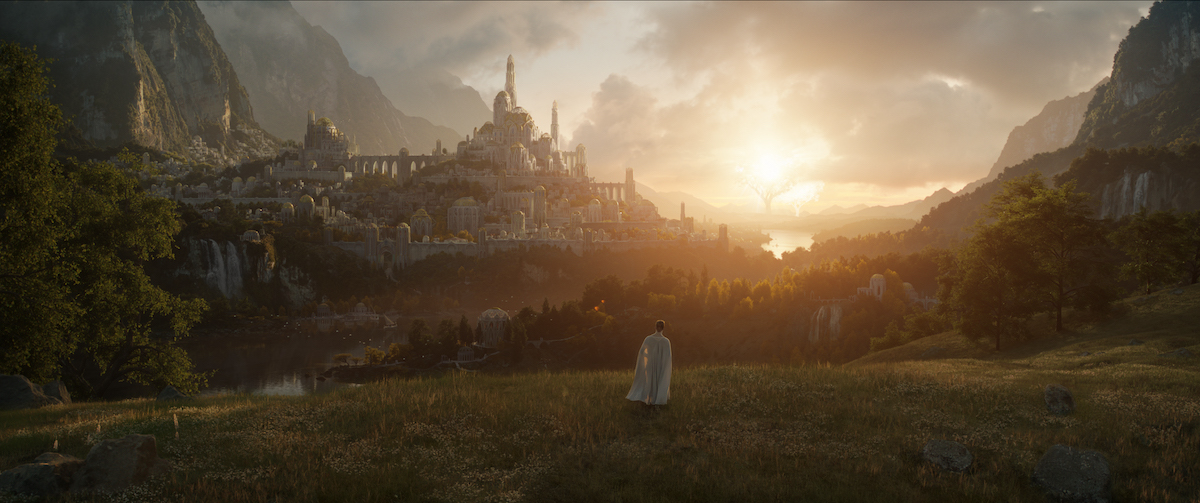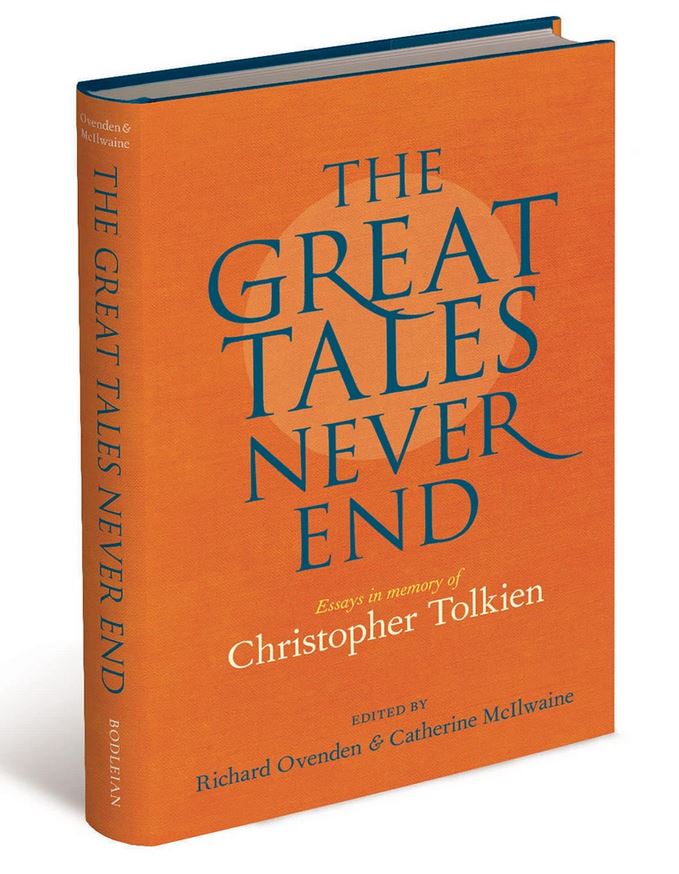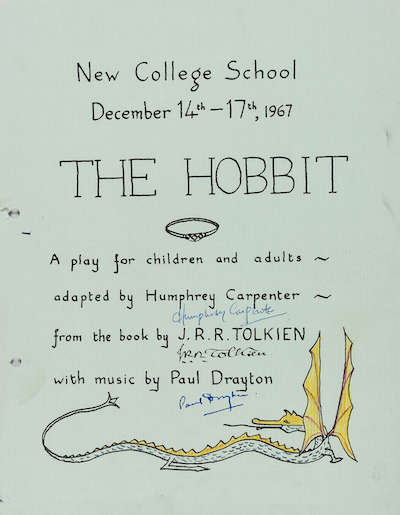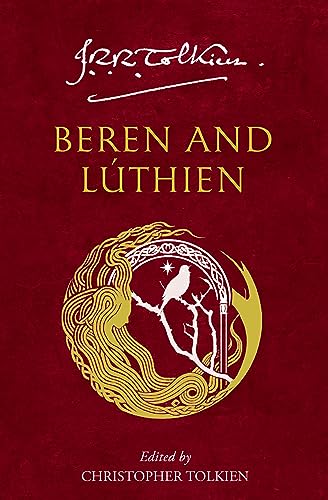A Tale Conceived Epically - Tolkien on Adapting His Works
31 Aug, 2022
(edited)
2022-8-31 10:11:16 PM UTC
2022-8-31 10:11:16 PM UTC

The Lord of the Rings: The Rings of Power - First Series Image - Courtesy of Amazon Studios
"I would draw some of the great tales in fullness, and leave many only placed in the scheme, and sketched. The cycles should be linked to a majestic whole, and yet leave scope for other minds and hands, wielding paint and music and drama."
(Letters #131)The Rings of Power showrunners often use this quote when talking about their show, and how they are filling in some of the (many, and large) gaps in Tolkien's writings about the Second Age, the time frame where their show is set. There is a lot of heated discussion about this quote amongst Tolkien fans, and whether Tolkien really was giving his blessing in some form or another for dramatic adaptations of his works, and especially for works that removed, or worse added, material to what Tolkien originally wrote. Shaun Gunner, chairman of The Tolkien Society, has written a good article about his take on this matter, but I wanted to go a little deeper into what Tolkien has said about adapting his works. There are many I will cover here, and many more that I couldn't find any particular statement from Tolkien about, so this is by no means a complete list.
What would J.R.R. Tolkien say about Amazon's The Rings of Power? We cannot ask him this question, but maybe we can learn a bit about his views on adapting his Middle-earth works by looking at his thoughts about the many adaptations made or pitched while he was still with us. Scull and Hammond write an accurate introduction to this subject in The J.R.R. Tolkien Companion and Guide: Reader's Guide Part 1 (2017, p. 9, "Adaptations"):
Tolkien took a deep interest in the ‘fortunes’ of his works, ‘as a parent would of a child’. (letter to Carole Batten-Phelps, autumn 1971, Letters, p. 413) He felt strongly about the uses to which his works were put and was selective in what he allowed, in so far as he had the authority to do so and circumstances permitted.... Tolkien held copyright in his works, but this did not go unchallenged, limiting his ability to deny permission for certain purposes; nor could he ignore the possibility of income from such projects, not only for himself and his family, but also for his publishers George Allen & Unwin, to whom he felt an obligation.
So, what uses did he allow, and what did he think of them? (nota bene - all quotes that have italics are from the original source. I have added all bold emphasis to call out points I think are important to this article)
Patrick Hobbit, 1953
The first dramatic adaptation mentioned by Scull and Hammond is a request for a stage version of The Hobbit in early 1953, made by Miss L.M.D. Patrick at St Margaret's School in Edinburgh for a private performance of the dramatization she has made for the school and parents (27 January 1953). Tolkien writes back (3 February 1953) giving free permission for the performance. It seems likely that the very limited scope (a private performance at a school) gave Tolkien no misgivings, as he evidently did not see any script or have any concerns.

BBC Radio Lord of the Rings, 1955-56
The history of the pitch, negotiations and end results of these performances is well documented in The Great Tales Never End (2022) by Stuart D. Lee's piece entitled "A Milestone in BBC History?" as well as in Scull and Hammond's Guide and Chronology. In a letter to Philip Unwin (Chronology, 29 January 1955 - Italics are Tolkien's own) Tolkien writes
I view the project with deep misgivings, and do not expect to derive anything but pain and irritation from the result. But so long as I am firmly advised by you that it is a "good thing" for the book, I am prepared to put up with that (Tolkien-George Allen & Unwin archives, HarperCollins)Tolkien corresponded with and met the producer Terence Tiller multiple times. Tolkien's letters to Tiller are very informative.
You cannot expect to please many readers (or the author) at many points; but if it is any comfort to you I may say that I have a good many letters about the radio-version, and while some are adverse many ‘readers’ enjoy it, and also tell me that non-readers get a great deal out of it.
While Tolkien found a few things to complement Tiller about - such as the Council of Elrond, which Tolkien told him was "masterly and got in all essentials without serious loss" - he went on to write a private letter to his friend Molly Waldron saying "I think the book quite unsuitable for 'dramatization', and have not enjoyed the broadcasts" (Chronology, 30 November 1955) of The Fellowship of the Ring, and to Naomi Mitchison, "I think poorly of the broadcast adaptations. Except for a few details I think they are not well done, even granted the script and the legitimacy of the enterprise (which I do not grant)." (8 December 1955)
Tolkien wrote this to Tiller (Letters 194):
I remain, of course, flattered and pleased that my book should receive this attention; but I still cannot help wondering: why this form? … Final query: can a tale not conceived dramatically but (for lack of a more precise term) epically, be dramatized- unless the dramatizer is given or takes liberties, as an independent person? I feel you have had a very hard task.
This feels like a rhetorical question, and no answer from Tiller is documented, but it is important to note - Tolkien gave permission for the Fellowship adaptation even after discussing the serious compression and adapting that Tiller was constrained to do. After hearing it (and complaining about how little he liked it), Tolkien went on to approve even more time-compressed adaptations of The Two Towers and The Return of the King. "Authors are no doubt often peevish folk! Still I must say that I should like to have the thing continued - if you are the producer." (15 December 1955) Why? Perhaps Tolkien answers in a roundabout way, when he wrote to his publisher "I suppose all this is good for sales" (Letters 177).
Zimmerman and Ackerman, 1957-1959
In the Spring of 1957, Al Brodax inquired with Allen & Unwin about making a movie of The Lord of the Rings and Tolkien responded with
As far as I am concerned personally, I should welcome the idea of an animated motion picture, with all the risk of vulgarization; and that quite apart from the glint of money, though on the brink of retirement that is not an unpleasant possibility. I think I should find vulgarization less painful than the sillification achieved by the B.B.C. (Letters #198)
Nothing more came of Brodax's inquiry, but a few months later a round of negotiations started through Forrest Ackerman, who was representing a group of young men headed by Morton Grady Zimmerman. In September Ackerman met with Tolkien, and a few days later Tolkien wrote to Rayner Unwin
Mr. Ackerman's line of talk was that a big object to the group was 'pleasing the author'. I have indicated to him that will not be easy. Quite crudely: displeasing the author requires a cash equivalent. Only the prospect of a very large financial profit would make me swallow some of the things in this script! (Letters #201)and then on 11 September Tolkien wrote to his son Christopher, "Stanley U & I have agreed on our policy: Art or Cash. Either very profitable terms indeed; or absolute author's veto on objectionable features or alterations." (Letters #202) Tolkien goes on to write
I feel very unhappy about the extreme silliness and incompetence of Z and his complete lack of respect for the original (it seems wilfully wrong without discernable technical reasons at nearly every point). But I need, and shall soon need very much indeed, money, and I am conscious of your rights and interests; so that I shall endeavour to restrain myself, and avoid all avoidable offence. (Letters #207)
I would ask [Zimmerman and team] to make an effort of imagination sufficient to understand the irritation (and on occasion the resentment) of an author, who finds, increasingly as he proceeds, his work treated as it would seem carelessly in general, in places recklessly, and with no evident signs of any appreciation of what it is all about... The canons of narrative art in any medium cannot be wholly different; and the failure of poor films is often precisely in exaggeration, and in the intrusion of unwarranted matter owing to not perceiving where the core of the original lies. (Letters #210)
People gallop about on Eagles at the least provocation; Lórien becomes a fairy-castle with 'delicate minarets', and all that sort of thing. But I am quite prepared to play ball, if they are open to advice - and if you decide that the thing is genuine, and worthwhile. (Letters #201)
The trouble is, of course, that I don't want (as far as that lies with me) to kill the project, which I think promised well on the pictorial side... (16 June 1958 letter to Rayner Unwin)
Rayner Unwin writes "The fact that he did [his lengthy and damning commentary] at all was in the hope of cash, not in the expectation of kudos. He was at this time worried, though increasingly against the evidence, by the fear of tax and indebtedness.... But killed it was, though whether because of Tolkien's demolition of the story-line or for lack of backing one does not know." (Remembrancer, p. 109)
Yale Drama Hobbit, 1959
In 1959, an unnamed person in the Yale Drama School asks for permission to perform a play of The Hobbit and sent along their script for Tolkien to read. Tolkien was not happy with it, as seen in this Chronology entry from Scull and Hammond (30 April 1959):
[Tolkien] admits to a prejudice against dramatization and any kind of 'children's theatre', but might change his mind if the adaptation were 'good of its kind'. The present effort, however, seems to him 'a mistaken attempt to turn certain episodes of The Hobbit into a sub-Disney farce for rather silly children.... At the same time, it is entirely derivative.' (Tolkien-George Allen & Unwin archive, HarperCollins)Tolkien and his publisher go on to eventually grant limited permission for performances but not for publication, sale or performance outside the Yale Drama School.

Drayton and Carpenter, 1967
Paul Drayton and Humphrey Carpenter were Oxford University undergraduates at this time, and wanted to put on a play of The Hobbit and thought it would be prudent to ask Tolkien for permission, which was granted.
Carpenter prepared the script with 'two main principles in mind. First, to retain the style and character of the book, and second, to impose dramatic shape upon it. The first simply involved using the existing dialogue wherever possible, and consciously adopting Tolkien's style when continuations and alterations had to be made.' The second principle was to omit 'incidents not absolutely vital to the plot - the trolls, the wolves, the eagles and Beorn. None of these occupy a strong place in the saga; they are trimmings, and easily disposed of.' ... Tolkien attended the final performance. 'He smiled a lot of the time', Carpenter recalled, in particular at the boy who played Bilbo as a 'fussy middle-aged bachelor'. But towards the end of the play, with notable departures from his book, Tolkien 'did not approve of this tinkering with the story'. (S&H, Reader's Guide Part I, pp. 9-10)
Carpenter elsewhere says that Tolkien "frowned when the musical departed from the story, but smiled when the original words were kept to" and that "Tolkien was very sociable, and they afterwards had a party at a mutual friend's house." (Amon Hen 91, p. 15).
Dramatic Publishing Company Hobbit, 1968
In late 1967, Tolkien and Rayner Unwin are dealing with the Dramatic Publishing Company from America, who want permission to produce and publish an adaptation of The Hobbit for the stage. Tolkien is not interested, but due to the tenuous state of the copyright in the USA at this time, DPC is insisting that it will go ahead with or without permission. They are willing to send a draft of the script to Tolkien for comment prior to publishing. On the 8th of May, 1968 Rayner writes to their American agent that
It would be useless to pretend that [Tolkien] likes this dramatization. As, however, it is presented to him virtually as a force majeure he has confined his comments and corrections to the very minimum, and only to those cases where the adapter has departed from the text of The Hobbit and, without any dramatic necessity, intruded his own invention." (Chronology)
Then on the 20th of June,
[Rayner Unwin] has discussed with Tolkien the changes the Dramatic Publishing Company are willing to make, and since these alterations have satisfied many of the points raised, the publication can go ahead. 'Neither Professor Tolkien nor I are concerned about the process of dramatization so long as it is a dramatization of the book in question and that intrusions from elsewhere conform to the spirit and style of the original. Tolkien has commented on the advertisement that 'he agrees the publication is with his authorization... he would not wish it to be said that the dramatization has his approval' (Chronology)
United Artists, 1969
It took nearly two years of negotiations between Tolkien/Allen & Unwin (through their US agent) to come to an agreement. Interestingly, "during those two years, the Beatles conceived a desire to star in an adaptation of The Lord of the Rings. Their production company, Apple Films, already had a relationship with UA, which had distributed the group's first two films, A Hard Day's Night (1964) and Help! (1965) in the United States. Some negotiations apparently occurred, but Tolkien threatened to withdraw from the ongoing talks with UA, and the Beatles' hopes were squelched." (Kristin Thompson, "Film Adaptations" p. 519-20, A Companion to J.R.R. Tolkien edited by Stuart D. Lee, 2014)
On the 20th of January 1969, Rayner writes to Tolkien, saying "I am perfectly certain that we shall both of us dislike intensely every manifestation of what is done to The Lord of the Rings.", and reminds him that "the book remains inviolable and that is the main thing. What they do with the property in other media will, I regret to say, be entirely their responsibility from an aesthetic point of view, will only vary in degrees between bad at best and execrable at the worst." (Chronology). The contract will be reviewed by Tolkien and the publisher in June, and signed on the 8th of July.
Conclusions, if any
Tolkien was under many and varied pressures, from work and writing, health issues and tax burdens (real or imagined) and the reasons for his accepting requests for permission to adapt numerous. It should hopefully be clear, however, that Tolkien was extremely consistent in three ways:
- he consistently worked to improve adaptations through feedback, rather than trying to kill them
- he found something to enjoy in every adaptation he saw or read
- he had no problem with massive deviations from his writings - which he quite clearly detested - as long as he was compensated for them
I think it is very telling that six months before signing the United Artists deal, both Tolkien and Rayner Unwin were cognizant that the deal would produce movies that could only be bad-to-execrable - and yet they both still signed the deal. "But he really needed the money!" you say, and that seems evidently clear - but Tolkien didn't need the money from the BBC, and detested the changes they made in the 1955 Radio adaptation of The Fellowship of the Ring, but he still allowed the remaining two volumes to be adapted as well. He detested dramatic stage adaptations of the Hobbit, but over and over again he allowed them to be written and performed.
It seems to me that the evidence is there to say that Tolkien appreciated seeing his works adapted dramatically, perhaps always hoping that someday someone would get it right, and willing to suffer through decades of failures always holding out the hope that someday someone would find Middle-earth on film or stage. Would Tolkien like The Rings of Power? No-one can say, certainly not me. I feel like he would dislike the inventions in much the same way as he did those dramatic inventions made while he was alive, but I also feel like he would have accepted the cash over kudos that Amazon offered.












 34
34 25.47K
25.47K